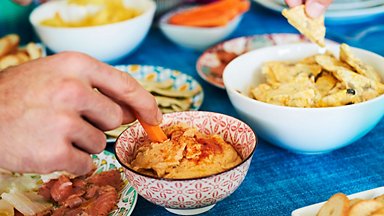CUSTOMER CASE
Creating the perfect hummus, together
Open dialogue leads to an efficient new production process for Middle Eastern hummus manufacturer
When experts from different disciplines get together to work on a common challenge, a little debate is only to be expected - indeed, celebrated!
In this real-world customer case, we describe how experts at our Product Development Centre in Lund worked with a Middle Eastern food producer to do the seemingly impossible: to recreate a forty-year-old hummus recipe provided by our client’s Egyptian grandmother….and scale it up for commercial production.

Establishing contact
Almarai, headquartered in Riyadh, Saudi Arabia, is one of the biggest food producers in the Middle East. A few years ago, they decided to start producing hummus – the quintessential Middle Eastern dip made with a mixture of chickpeas, tahini, garlic, and lemon juice. They already had several production lines from another supplier but were not completely satisfied with the cost and performance of this existing equipment.
Mats W. Andersson, who was then business development manager for Tetra Pak in the Middle East explains, “Since we knew Almarai had misgivings about their equipment supplier, we decided to call them for a no-strings-attached business update. Quite soon afterwards, they asked us if we could provide them with a line solution for the production of fresh hummus.”
The product development process
The project sponsor on Almarai’s side was Egyptian and his product brief was rather unusual. He wanted us to reproduce a hummus dip like the one his grandmother used to make 40 years ago.

“Although this was rather an approximate starting point …never let it be said that we shy away from a challenge!”
Mats Andersson,
former business development manager for Tetra Pak in the Middle East
Almarai brought some hummus samples to the Product Development Centre in Lund, Sweden and, over a period of three days, they tested a variety of different product formulas together. The formulas were based on a combination of the hummus samples along with the grandmother’s original recipe, and resulted in a basic recipe that everyone agreed was suitable to try out in the pilot plant.
While hummus may be a generic chickpea dip to the untrained palette, the different hummus-eating regions have quite strong opinions about what constitutes ‘quality’. Egyptian, Greek, Lebanese, Turkish, and Israeli hummus all start from the same basic recipe, but the consistency and flavour vary according to the added ingredients and how the hummus is processed. In this case, the Almarai representative was very clear about the desired consistency. “He wanted to be able to tilt his plate 45 degrees without the hummus running off!” recalls Mats.

”… everyone brought useful information to the table and both sides discussed the pros and cons freely.”
Mats Andersson,
former business development manager for Tetra Pak in the Middle East
Recommendations for line and process design
Tetra Pak’s for the new Almarai hummus line was that it should be based on continuous, not batch production. We also recommended they should make a long-life, rather than a fresh hummus. Even though this conflicted with the client’s plan to make hummus available in the bread section of the supermarkets (and place 850 000 fridges to accommodate it) they were open to discussing the options.
In the end, a compromise was reached. Tetra Pak would develop a non-aseptic batch line solution and an optimised, continuous production system. ‘Thanks to a very open, professional dialogue, in which everyone brought useful information to the table and both sides discussed the pros and cons freely, we were able to design a line that met Almarai’s criteria”, concludes Mats.
Tetra Pak becomes a qualified hummus equipment supplier
These trials showed that Tetra Pak was a serious collaboration partner – not only committed to delivering what the customer asked for, but also willing to challenge their preconceptions, to listen carefully and to compromise. It resulted in Tetra Pak being granted the title of ‘qualified hummus equipment supplier’ to Almarai.
“Due to an unexpected turn of events” explains Mats, “AlMarai is not producing hummus on Tetra Pak equipment today. But this does not detract from the fact that our intensive trial process deepened our respect for one another and generated very valuable learnings on all sides.”







